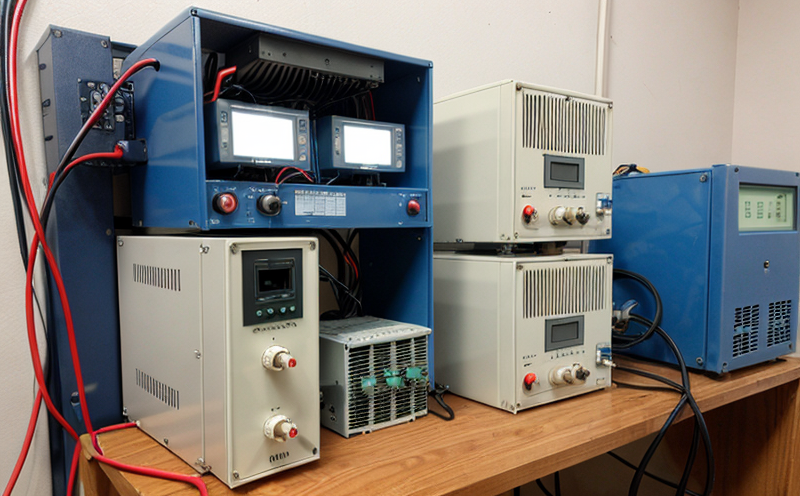IEC 61215 Electrical Safety Testing of Power Modules
The International Electrotechnical Commission (IEC) standards are globally recognized for ensuring electrical safety and performance. IEC 61215 specifically addresses the electrical safety testing of photovoltaic (PV) power modules, which are critical components in renewable energy systems. This standard is crucial not only for manufacturers but also for quality managers, compliance officers, R&D engineers, and procurement professionals within railway and transportation sectors.
The primary aim of IEC 61215 is to provide a framework that ensures the electrical safety of PV power modules by subjecting them to rigorous testing procedures. This includes tests for insulation resistance, current leakage, voltage withstand capability, and other parameters critical to the safe operation of these devices in various environments. The railway industry often uses solar energy systems for auxiliary power supply, signal lights, and even for onboard charging stations. Ensuring that PV modules meet IEC 61215 standards is vital for the reliability and safety of such installations.
The testing process under IEC 61215 involves multiple stages designed to simulate real-world conditions. For instance, insulation resistance tests are conducted to ensure that there is minimal current leakage between different parts of the module. Voltage withstand capability tests assess how well a module can handle overvoltages without compromising its integrity. Current leakage tests help in identifying any potential short circuits within the module, which could lead to overheating and fire hazards.
During specimen preparation for IEC 61215 testing, it is essential that the modules are prepared according to the standard's specifications. This includes cleaning the surface of the module to remove any dust or debris, ensuring that all connections are secure, and calibrating test equipment accurately. The chosen instrumentation must be capable of delivering precise measurements, which are critical for accurate results.
The acceptance criteria in IEC 61215 are stringent and ensure compliance with international standards. Modules failing to meet these criteria can pose significant risks not only to the immediate environment but also to larger railway systems where such modules might be integrated. By adhering to these standards, manufacturers can build trust among end-users who rely on reliable and safe PV power modules.
For R&D engineers involved in the development of new PV technologies for railway applications, IEC 61215 serves as a vital reference document. It provides guidelines that help in designing robust and efficient solar energy systems. Compliance with this standard ensures that any innovations are thoroughly tested and validated before being deployed in real-world scenarios.
Quality managers and procurement professionals benefit greatly from ensuring compliance with IEC 61215 standards. Consistent adherence to these standards not only enhances product quality but also simplifies the procurement process by providing clear, internationally recognized benchmarks for selecting suppliers and materials.
Benefits
- Enhanced Safety: Ensures that PV power modules are safe from electrical hazards, thereby protecting personnel and equipment in railway environments.
- Improved Reputation: Compliance with IEC 61215 enhances the reputation of manufacturers among customers and regulatory bodies.
- Avoidance of Legal Issues: Meeting international standards reduces the risk of non-compliance penalties and legal disputes related to product safety.
- Market Access: Compliance with IEC 61215 can open up new markets for railway-related PV solutions, as many jurisdictions require adherence to this standard.
In summary, compliance with IEC 61215 is not just a regulatory requirement but also a strategic decision that contributes significantly to the safety and reliability of railway systems powered by solar energy. It ensures that every component meets stringent electrical safety standards, thereby minimizing risks associated with electrical failures.
Why Choose This Test
- Global Recognition: IEC 61215 is a globally recognized standard, ensuring uniformity in testing protocols and results across different regions.
- Regulatory Compliance: Adherence to this standard helps manufacturers meet regulatory requirements set by various countries and international bodies.
- Improved Product Quality: Rigorous testing under IEC 61215 ensures that PV power modules are of high quality, reliable, and safe for use in railway applications.
- Cost Savings: While initial compliance costs may seem high, the long-term benefits include reduced warranty claims and increased product longevity, leading to cost savings over time.
Selecting IEC 61215 testing ensures that your PV power modules meet stringent electrical safety standards. This not only builds trust with end-users but also positions your products as reliable and safe in a competitive market. The tests are designed to simulate real-world conditions, ensuring that the modules perform reliably under various environmental stresses.
Competitive Advantage and Market Impact
Compliance with IEC 61215 can provide significant competitive advantages for manufacturers of PV power modules. In an increasingly globalized market, standards like this serve as a benchmark that consumers and regulatory bodies trust. By adhering to these standards, you not only meet the legal requirements but also set yourself apart from competitors who may not comply.
The railway sector is particularly sensitive to safety and reliability in its power supply systems. Ensuring that PV modules used in such applications meet IEC 61215 standards can enhance your product's reputation, leading to increased market share. Additionally, compliance with international standards opens doors to new markets where these requirements are enforced.
For quality managers, ensuring that all components of railway systems comply with IEC 61215 is crucial. It ensures that the entire system operates safely and efficiently, reducing the risk of failures that could disrupt operations or cause safety hazards. This not only improves operational reliability but also enhances the overall safety culture within organizations.
In conclusion, choosing IEC 61215 testing for your PV power modules can provide a competitive edge in terms of market reputation and regulatory compliance. It positions you as a leader in providing safe and reliable products that meet global standards.





